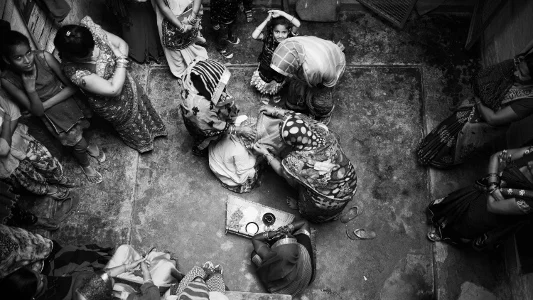Learning to take care of my diabetic grandmother

I belong to a normal South Asian household, where it’s common to live as a joint family under the love and blessing of your grandparents. Growing up in such a family is a luxury as you receive an enormous amount of love, care, and attention, not just from your parents but also from your grandparents. This is why I’m really attached to my grandma, even more so than my own parents.
In 2014 my grandma was diagnosed with diabetes – It was the most heart-wrenching day of my life.
I thought of how she used to make all my favourite dishes and how her hands would lovingly caress my face every time I had a fever. The thought of losing her terrified me. Even though deep down I knew that diabetes could be treated and she wasn’t necessarily going to die because of it, the fear of losing her felt so real and palpable.
The next few months were really tough, as we had to completely change our eating habits and lifestyle to take care of her diabetes. It was a huge learning curve for all of us, but thankfully we managed to get through it, and she is doing much better now.
Here are a few things I learned while caring for her:
The challenges of caring for a diabetic grandmother
It’s not easy to take care of a diabetic grandmother. As an older diabetic, my grandmother is at a higher risk for developing serious complications, such as heart disease, stroke, kidney disease, and blindness. She’s also more likely to experience depression and anxiety due to the stress of managing her condition.
As her primary caregiver, it’s my job to be supportive and understanding and help my grandmother stay on track with her treatment plan. For example, my grandmother sometimes gets fed up with the daily insulin injections and blood glucose testing (a common feeling, known as diabetes burnout), but these are both critical to keeping her healthy and happy. My role when she feels like this is to be her champion, doing my best to keep her motivated and focused.
How to create a care plan for a diabetic grandmother
- Make sure she eats healthy and balanced meals, including plenty of fruits, vegetables, whole grains, and lean protein. Help her to create a meal plan that fits her lifestyle and preferences – For my grandmother, this means lots of cauliflower, zucchini, okra, and eggplant. She’s also very fond of paneer and cashews.
- Encourage her to be active. Exercise is an important part of managing diabetes; it can help lower blood sugar levels, improve insulin sensitivity, and reduce the risk of complications. Help your grandmother find an activity that she enjoys, and make sure she gets at least 30 minutes of exercise each day – My grandmother goes for a brisk walk every evening, and enjoys gardening. To help motivate her to stick to her exercise routine and physical activities, I join her in them whenever I’m able.
- Help her monitor her blood sugar levels. This includes checking her blood sugar level before meals and snacks, after exercise, and at bedtime. You may also need to help her administer insulin injections or use a continuous glucose monitor – My grandmother regularly changes the site of her injections so she doesn’t get too sore in any particular area. To help her, I inject for her in places she can’t otherwise easily reach. This gives her more options and allows her to spread her injection sites further apart.
- Make sure she sees her doctor regularly. Diabetics should see their doctor at least once a year for a comprehensive diabetes checkup. This appointment will include a physical exam, blood tests, and other measures to assess her condition – My grandmother can’t drive, so I help her get to and from her appointments and make sure they’re scheduled at times convenient for her. I also pick up her prescriptions, help her manage her medications and keep our family informed of her condition (so we can all share information and support her as best we can).
The dangers of neglecting diabetes care
It’s important to remember that diabetes is a serious condition, and if you don’t manage it properly, it can lead to potentially life-threatening complications.
It’s easy to feel overwhelmed, and in the beginning, I was often unsure how to best help my grandmother. However, I knew that there were several people I could reach out to for support and advice. This included my grandmother’s doctor, her diabetes educator, and also my younger uncle (a doctor himself). This network of people was always able to help me identify my grandmother’s individual needs, review her diabetes plan, and give me the tools I needed to care for her effectively.
What to do in an emergency situation involving diabetes
If your diabetic grandmother experiences a low blood sugar episode, it’s important to act quickly.
I carry small packets of jellies or candy on me at all times, so that if my grandmother’s blood sugar level drops I can give her a quick source of sugar. After she’s had a chance to eat or drink, I wait 15 minutes and then re-check her blood sugar level. If it’s still low, I give her another dose of sugar. If it’s still low after 2 doses of sugar, or if she seems confused or groggy, I know I need to call for assistance – It’s a medical emergency, and she needs to see a doctor as soon as possible.
Final thoughts
At first, it was hard for me to accept and fit into my grandmother’s new routine. However, as her eldest grandson, it was my responsibility to take care of her diet plans and exercise timings.
And the more I helped out the easier it became, and the more fun!
When you’re caring for someone with diabetes, it’s important to have a support system. I was fortunate in that our family and friends were all there for my grandmother.
Caring for my grandmother is challenging at times, but it’s also an incredibly rewarding experience. And seeing my grandmother continue to live a healthy, happy life, despite her condition, is the ultimate reward.
Looking for more stories like this?
When Lisa’s dad was diagnosed with type 2 diabetes, she suddenly became a primary caregiver. Here are 9 things she wishes she’d known from Day 1.
Joining the workforce, Nirvaanika was keen to climb the corporate ladder. But first, she had to learn how to balance her work and her type 2 diabetes.
Supporting her type 2 diabetic father, Lisa learned early that people didn’t like to talk about his disease. But talking about it made it easier to manage.








